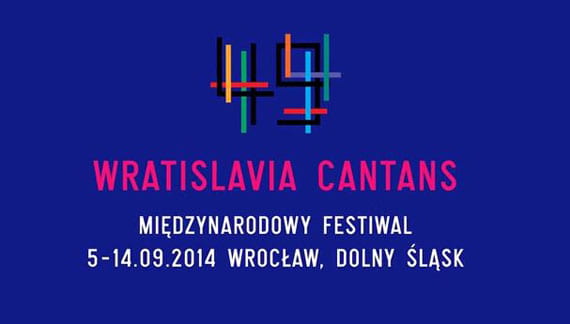From September 5-14, 2014, the 49th International Festival Wratislavia Cantans will draw the attention of the musical world, inviting to Wrocław and Lower Silesia artists of the highest order. For the second time the concept of the festival is authored by Giovanni Antonini, who this year guides audiences “From Darkness to Light.”
The splendor of compositional excellence shines in Handel’s Concerto grosso in G major, the piece opening this year’s festival, performed by Il Giardino Armonico led by Meastro Antonini. At the inaugural concert the Italian group teams up with the Chor des Bayerischen Rundfunks in a performance of Bach’s and Vivaldi’s settings of Magnificat, full of divine majesty.
Some 20th-century composers believed that the night’s darkness, sometimes lit up by the stars, favored metaphysical considerations. “Lux Aeterna” (Sept. 6) is the concert programmed around this idea, featuring Karol Szymanowski’s Symphony No. 3 ‘Song of the Night’ and Igor Stravinsky’s Zvezdolikyi. The latter title, borrowed from a work by György Ligeti, reflects many artists’ belief in eternal light defeating the darkness of death. Images of twilight or darkness symbolizing the end of life can be seen in several settings of Requiem and other works of funeral music written by Jan Dismas Zelenka, Henry Purcell, Grzegorz Gerwazy Gorczycki and Ludwig van Beethoven. Beethoven treated the subject of demise in a very pragmatic way, composing, soon after his Cantata on the Death of Emperor Joseph II, a new cantata for the celebrations of enthroning the successor of Joseph II. Both works will be performed by the participants of the Oratorio and Cantata Music Interpretation Couse, an inextricable part of the festival for decades now.
An interesting strand of this year’s Wratislavia Cantans is sacred music devoted to the Virgin Mary. The festival will open with two settings of Magnificat (Sept. 5) and in the following days Karol Szymanowski’s deeply moving Stabat Mater (Sept. 6) and the medieval Messe de Nostre Dame by Guillaume de Machaut (Sept. 10).
Wratislavia Cantans is a festival focusing on the phenomenal possibilities of human voice, however there will be some instrumental jewels too, performer by violinist Liana Mosca with pianist Pierre Goy (Sept. 8), pianist Kiristian Bezuindenhout (Sept. 12), and the glorious Sol Gabetta (Sept. 10), who years ago appeared at Wratislavia Cantans, already a very promising cellist at that time. Maestro Antonini is open to musical quests and explorations. Therefore he has tasked the Belgian Graindelavoix, evoking extreme emotions in musical circles, with performing the medieval Messe de Nostre Dame. Nobody can predict what will happen during the concert featuring cellist Giovanni Sollima (Sept. 8), who won audiences’ hearts last year. An unusual event will be the concert featuring children only (Sept. 13), when the Wrocław children’s choirs will join forces with Orchestra Suzuki di Torino, the youngest chamber orchestra in the world, whose members’ training is based on the famous and controversial Suzuki method. A special event will be the concert of Sławomir Zubrzycki playing the viola organista designed by Leonardo da Vinci (Sept. 14). This musical invention fell in oblivion and did not see the light of day until Zubrzycki built the instrument following the sketches left by the Renaissance genius.
The festival will close with a work ideally suited to the spirit of Wratislavia Cantans – the monumental Creation by Joseph Haydn, featuring the Wrocław Philharmonic Choir, Gabrieli Players and Paul McCreesh, the best conductor we can dream of to meet the challenge of this famous oratorio (Sept. 14). The first act of creation was the making of light, and if you believe Maestro Antonini, music is the light that brightens up our lives. Wrocław and Lower Silesia will shine with the light of the most beautiful music for the 10 days of the 49th International Festival Wratislavia Cantans.
[Source: 2014.wratislaviacantans.pl]
